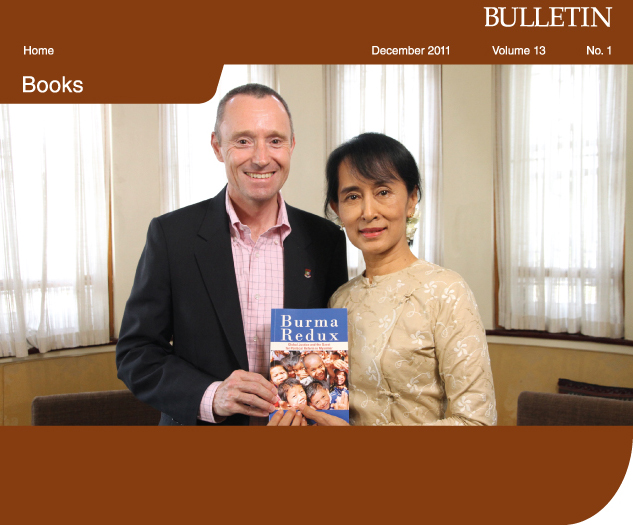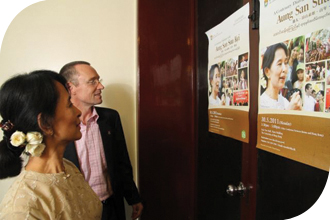
|
Professor Ian Holliday's new book, Burma Redux, is based around the question of how the world can help, and he put it to Daw Suu. "First of all," she said, "they've got to take an interest in what's happening in Burma, to really find out what's going on here. And then they can do practical things like getting in touch with the NLD (National League for Democracy, Daw Suu's political party) and getting in touch with all these other organizations outside Burma who are trying to help us to achieve democracy." The answer could have been a synopsis of Professor Holliday's own involvement in Burma. He first became interested 12 years ago when he moved to Hong Kong as a political science scholar and started reading up on Asia. He was increasingly drawn to Burma, a resource-rich but poorly-developed country where post-colonialism has gone spectacularly badly, and he began using his academic connections as a platform to shed light and offer help. He launched an annual Burma conference to bring together academics from Asia and the West and civil society leaders from Burma to discuss the country and its future. He also started the MOEI programme in 2008 to send undergraduates to the Thai-Burma border for eight-week periods to teach English to Burmese refugees. The programme is named after the river that separates the two countries for much of its length. Burma Redux developed alongside these initiatives and asks specifically how the outside world can help a country that has been under military rule since 1962 to achieve meaningful, more democratic change. It draws in part from the views of Burmese people, gathered in 'listening projects' run by NGOs. Not everyone adheres to Daw Suu's ideals for a democratic society, at least for the time being. "One of the conclusions I reach is that the outside world can't take any choices for the Burmese people. We shouldn't be looking to develop ready-made solutions that we ship into Burma," he says. "The Burmese people may take the same decision that the Chinese people have taken, at least over the past 30 years, which is to do a deal with authoritarianism if it brings them economic benefit and enhanced opportunities at the individual level." "We have to recognize that if the government can deliver stable growth over the next 10 to 20 years, then the Burmese people may not have a strong taste for major democratic change – they may say this is good enough for now." Another finding is that civil society is re-emerging in the country, particularly in the wake of Cyclone Nargis in 2008 which caused terrible flooding and destruction and resulted in much human suffering including at least 140,000 deaths. The military junta was fearful of letting foreigners in to provide relief, so the Burmese people had to sort out the problems themselves. "The long-term benefit of that has been that they've become more capable of community action. That has to be a resource for the future," Professor Holliday says. In discussing how the outside world can support Burma, he takes a strong stance against sanctions, which departs from Daw Suu's views. She believes sanctions harm the military leaders, not the people, but Professor Holliday says the data do not support his. Nor did any of the academics and civil leaders who attended his most recent Burma conference in June. "She is really out on a limb as far as that issue is concerned," he says. The book places Burma's history and current circumstances within a wider context of global justice, which has become a topic of growing debate as people become more directly interested and connected with global crises through satellite TV and the Internet. "There's been a huge rise in academic debate about global justice and what the rich world can do when there are humanitarian crises and structural problems like you find in Burma, where the military machine is so powerful and tends to crush any attempt at democratic change." |
|||
"What the wider world can do to help is to support grassroots, bottom-up efforts and allow a thousand flowers to bloom inside Burma."
A view that Daw Suu would undoubtedly endorse. Burma Redux: Global Justice and the Quest for Political Reform in Myanmar is published by Hong Kong University Press and Silkworm, and later by Columbia University Press. |  |
| Back | ||